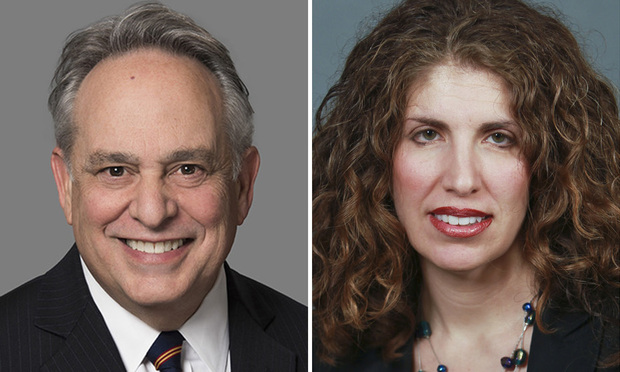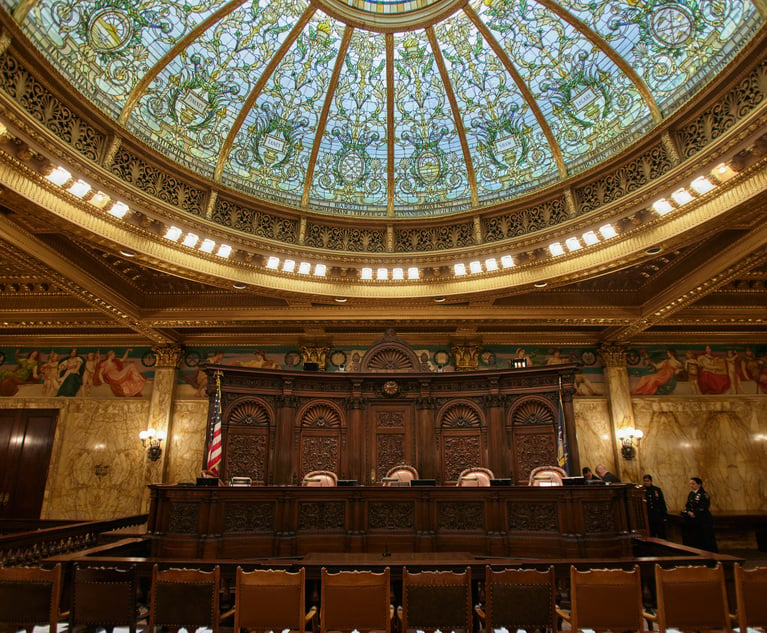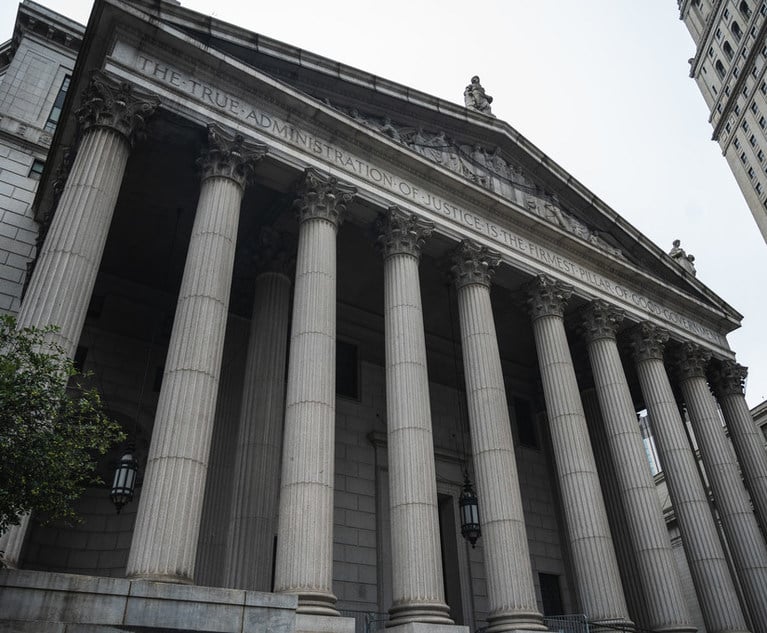New York Fusion Laws and the Joe Crowley Imbroglio
In 1960 Richard Nixon and John Kennedy battled for New York's all-important 45 electoral college votes. Nixon proved more popular among Republicans than Kennedy was among Democrats—Nixon received 3,446,419 votes on the GOP line to Kennedy's 3,423,909 on the Democratic line, a margin for Nixon of some 23,000 votes.
August 10, 2018 at 11:47 AM
5 minute read
 Jerry H. Goldfeder and Myrna Pérez
Jerry H. Goldfeder and Myrna PérezIn 1960 Richard Nixon and John Kennedy battled for New York's all-important 45 electoral college votes. Nixon proved more popular among Republicans than Kennedy was among Democrats—Nixon received 3,446,419 votes on the GOP line to Kennedy's 3,423,909 on the Democratic line, a margin for Nixon of some 23,000 votes. In any other state in the union, Nixon would have won the state and all of its electoral college votes. That would have resulted in 264 electoral college votes for Nixon—just short of the magic number of 269 that year—and 258 for Kennedy. Sen. Harry F. Byrd from Virginia received the remaining 15 electoral college votes. With no candidate receiving an electoral college majority, the presidential election would have been thrown into the House of Representatives for the first time since 1824.
Fortunately for Kennedy, New York had—and still has—“fusion,” a procedure that permits a candidate to run on multiple lines and whose vote totals from the various parties are added together. In 1960, the Liberal party (which lost its party status in 2002) cross-endorsed Kennedy, and he received 406,176 votes on that line—enough to make up Nixon's margin in the Republican-Democratic contest. Thus, Kennedy won the popular vote in New York, and with it the state's electoral college vote. The result was 303 electoral college votes for Kennedy and only 219 for Nixon, a decisive margin that avoided a political crisis.
New York's fusion laws are back in the news. As reported worldwide, New York Rep. Joseph Crowley lost his Democratic party re-nomination bid last month to Alexandria Ocasio-Cortez. But he ran unopposed in the Working Families party primary, and, therefore, he is the WFP candidate in the November general election. This is not unusual. We have eight political parties in New York, and a candidate can consent to run on multiple lines if those parties ask him or her to do so. A Democratic candidate will frequently run on the Working Families and Women's Equality lines, and Republicans will often get the Conservative and Reform party nods. The Independence party is known to support either, and the Green party goes it alone. Candidates for Supreme Court justice sometimes run on all major party lines. So, it is not unprecedented for a candidate who loses a major party primary to appear in the general election on another party line. For example, in 1977, Mario Cuomo lost the Democratic party nomination for mayor of New York City to Ed Koch, but continued to run as the Liberal party nominee. Similarly, in 1980, Sen. Jacob Javits lost the Republican party re-nomination to Al D'Amato, but ran on the Liberal party line.
Crowley has taken a different tack. Although he remains on the Working Families line, he immediately endorsed Ocasio-Cortez for the congressional seat. This is not unlike what Andrew Cuomo did in 2002. Running for governor that year, he dropped out right before the primaries and endorsed the eventual Democratic candidate H. Carl McCall. But Cuomo was running unopposed for the Liberal party nomination, and the timing was such that he, like Crowley, could no longer unilaterally decline the Liberal line. So, though he supported McCall, Cuomo's name appeared on the general election ballot.
The only way Crowley in 2018 or Cuomo in 2002 could have been removed from the ballot was by dying, moving out of the state (because of various residency requirements) or running for another office (if, of course, eligible to do so). Putting aside the option of dying (or in a state race, being convicted of a felony), neither Crowley nor Cuomo wished to move or run for some other office, like Assembly or state Senate. Crowley bluntly said that such a switch would be a “fraud on the voters.” In both cases, then, someone no longer seeking an office remains on the ballot—a situation that is obviously confusing to the voter.
Every now and again, there is a smattering of public sentiment to eliminate cross-endorsements and fusion voting on the theory that there is too much horse trading between and among the parties. Yet, fusion certainly has its supporters. After all, it does allow a party to build coalitions with other parties and provide greater support for particular candidates. And sometimes, as shown by the Kennedy-Nixon race, fusion could have an historically significant impact.
The Green party sees it differently. It has a party rule that eschews fusion, and routinely nominates only members of its own party rather than engage in deals with other parties. Of course, the Green party's position could have its own consequences, such as arguably occurred in the 2000 and 2016 presidential elections. In those cases, the Green candidate garnered sufficient votes to affect the outcome in key states without its own candidate even coming close to winning.
In a word, then, election procedures can have far reaching political significance. Whether or not the Rep. Crowley situation leads to a change in the law—or even an impact on the upcoming congressional election—remains to be seen.
Jerry H. Goldfeder, special counsel at Stroock & Stroock & Lavan, teaches election law at Fordham Law School and the University of Pennsylvania Law School, and is the author of “Goldfeder's Modern Election Law” (NY Legal Pub. Corp., Fifth Ed., 2018).
Myrna Pérez is the director of the Voting Rights and Elections Project at the Brennan Center for Justice at New York University School of Law, and regularly litigates voting rights cases.
This content has been archived. It is available through our partners, LexisNexis® and Bloomberg Law.
To view this content, please continue to their sites.
Not a Lexis Subscriber?
Subscribe Now
Not a Bloomberg Law Subscriber?
Subscribe Now
NOT FOR REPRINT
© 2025 ALM Global, LLC, All Rights Reserved. Request academic re-use from www.copyright.com. All other uses, submit a request to [email protected]. For more information visit Asset & Logo Licensing.
You Might Like
View All
Decision of the Day: Trial Court's Sidestep of 'Batson' Deprived Defendant of Challenge to Jury Discrimination

Decision of the Day: Commercial Division Finds Defendant Engaged in Unfair Competition Against Plaintiff

Decision of the Day: Court Rules on Judgment Motions Over Police Killing of Pet Dog While Executing Warrant

Decision of the Day: JFK to Paris Stowaway's Bail Revocation Explained
Trending Stories
- 1Uber Files RICO Suit Against Plaintiff-Side Firms Alleging Fraudulent Injury Claims
- 2The Law Firm Disrupted: Scrutinizing the Elephant More Than the Mouse
- 3Inherent Diminished Value Damages Unavailable to 3rd-Party Claimants, Court Says
- 4Pa. Defense Firm Sued by Client Over Ex-Eagles Player's $43.5M Med Mal Win
- 5Losses Mount at Morris Manning, but Departing Ex-Chair Stays Bullish About His Old Firm's Future
Who Got The Work
J. Brugh Lower of Gibbons has entered an appearance for industrial equipment supplier Devco Corporation in a pending trademark infringement lawsuit. The suit, accusing the defendant of selling knock-off Graco products, was filed Dec. 18 in New Jersey District Court by Rivkin Radler on behalf of Graco Inc. and Graco Minnesota. The case, assigned to U.S. District Judge Zahid N. Quraishi, is 3:24-cv-11294, Graco Inc. et al v. Devco Corporation.
Who Got The Work
Rebecca Maller-Stein and Kent A. Yalowitz of Arnold & Porter Kaye Scholer have entered their appearances for Hanaco Venture Capital and its executives, Lior Prosor and David Frankel, in a pending securities lawsuit. The action, filed on Dec. 24 in New York Southern District Court by Zell, Aron & Co. on behalf of Goldeneye Advisors, accuses the defendants of negligently and fraudulently managing the plaintiff's $1 million investment. The case, assigned to U.S. District Judge Vernon S. Broderick, is 1:24-cv-09918, Goldeneye Advisors, LLC v. Hanaco Venture Capital, Ltd. et al.
Who Got The Work
Attorneys from A&O Shearman has stepped in as defense counsel for Toronto-Dominion Bank and other defendants in a pending securities class action. The suit, filed Dec. 11 in New York Southern District Court by Bleichmar Fonti & Auld, accuses the defendants of concealing the bank's 'pervasive' deficiencies in regards to its compliance with the Bank Secrecy Act and the quality of its anti-money laundering controls. The case, assigned to U.S. District Judge Arun Subramanian, is 1:24-cv-09445, Gonzalez v. The Toronto-Dominion Bank et al.
Who Got The Work
Crown Castle International, a Pennsylvania company providing shared communications infrastructure, has turned to Luke D. Wolf of Gordon Rees Scully Mansukhani to fend off a pending breach-of-contract lawsuit. The court action, filed Nov. 25 in Michigan Eastern District Court by Hooper Hathaway PC on behalf of The Town Residences LLC, accuses Crown Castle of failing to transfer approximately $30,000 in utility payments from T-Mobile in breach of a roof-top lease and assignment agreement. The case, assigned to U.S. District Judge Susan K. Declercq, is 2:24-cv-13131, The Town Residences LLC v. T-Mobile US, Inc. et al.
Who Got The Work
Wilfred P. Coronato and Daniel M. Schwartz of McCarter & English have stepped in as defense counsel to Electrolux Home Products Inc. in a pending product liability lawsuit. The court action, filed Nov. 26 in New York Eastern District Court by Poulos Lopiccolo PC and Nagel Rice LLP on behalf of David Stern, alleges that the defendant's refrigerators’ drawers and shelving repeatedly break and fall apart within months after purchase. The case, assigned to U.S. District Judge Joan M. Azrack, is 2:24-cv-08204, Stern v. Electrolux Home Products, Inc.
Featured Firms
Law Offices of Gary Martin Hays & Associates, P.C.
(470) 294-1674
Law Offices of Mark E. Salomone
(857) 444-6468
Smith & Hassler
(713) 739-1250






